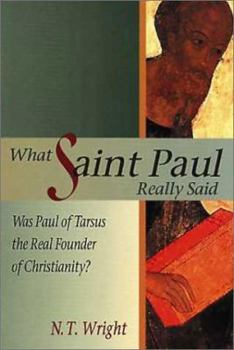What Saint Paul Really Said: Was Paul of Tarsus the Real Founder of Christianity?
Select Format
Select Condition 
Book Overview
Tom Wright, especialista mundialmente reconocido en la vida y las ep stolas de Pablo, nos explica de forma concisa cu l fue la verdadera contribuci n de Pablo al nacimiento del cristianismo. Este an... This description may be from another edition of this product.
Format:Paperback
Language:English
ISBN:0802844456
ISBN13:9780802844453
Release Date:June 1997
Publisher:William B. Eerdmans Publishing Company
Length:192 Pages
Weight:0.63 lbs.
Dimensions:0.4" x 5.9" x 9.0"
Customer Reviews
3 ratings
Outstanding scholarship
Published by Thriftbooks.com User , 18 years ago
Wow... This is one of the best books on Pauline thought I have ever read. It is difficult for many Western Christians to hear, but much of what we believe about what Paul really said is born out of the polemics of the reformation and counter-reformation. Eastern Orthodoxy never went through the fires of a reformation (save a comparatively minor bout with iconoclasm that did not end up splitting the eastern wing of the church). Thus, it is arguable that the three great branches of Christianity ended up developing Pauline theology in different ways due to historical forces largely beyond any one individual's control. This book, it seems to this reviewer, tries to cut through the muddle by placing Paul firmly in his first century context. The image of what St. Paul really said emerges as layer after layer of what has been added to Paul by centuries of history and scholarship (liberal and conservative) is removed. Those fiercely loyal to the 16th century reformationist view of Paul will find some things to agree with in this book, but for the most part will be challenged. Those loyal to the Catholic tradition will perhaps be less challenged by overall thesis of the book, but they will be challenged to examine just where Protestants get Paul "right." I have one observation about the supposed "New Perspective." It is, to me, a problematic moniker. Rather, Wright seems to be arguing for the "orthodox perspective" (small "o") of Paul. This book is way more Catholic and Orthodox than many other evangelical Protestants might like. This book is more protestant than some Catholics (especially traditionalists) might like. However, it is clearly not an exercise in syncretic ecumenism. Rather, Wright is pointing to truth, by giving an authentically biblical and historical reading of the Pauline texts, and letting the evidence, as opposed to any pre-existing loyalty to a dogma, lead him where it may. This is what the best biblical scholars do. And Wright is one of the best living.
Paul in His Context !!
Published by Thriftbooks.com User , 18 years ago
Wrights treatment on Paul aims to grasp Paul the apostle in his context of his own day and age and all that implies. Protestant christians will be uncomfortable with Wright's take on justification, and maybe a few other things, but relax, Wright is not out to short circuit a gospel of grace, contrary to the accusations by some. Wright makes many very bona fide points in this work, and it is very much worth learning from. For instance: The apostle Paul's main message was not how to go to heaven when you die ( as if that's what was being asked by first century Jews of Paul's day and age ), but rather Paul's message was simply that Jesus is Lord. Jesus is the true King not Caesar, or anyone else. Jesus is God's son, and as such is the Lord of the universe. Jesus is The God ordained location of God's redeeming and ruling activity. Wright's worth is that he aims to help biblical readers situate the new testament in it's first century Jewish context, and then see what that means for the good news of Jesus that the new testament proclaims. For the most part, not withstanding a few possible gliches, he does a much needed job at that.
Tentatively, I find this book superlative
Published by Thriftbooks.com User , 21 years ago
I have skimmed or read in detail most of Wright's book, but since I will be working with it for the rest of this semester I may find need to reappraise it. So far, so good, as I am concerned.This book is only "dangerous" and "unorthodox" if you interpret the entire Pauline corpus based on Romans 5 and Galatians 3. Wright's claim is that a larger horizon needs to be accorded to Paul's thought than justification by faith (which is NEVER "alone")--however, what some other reviewers here neglect to mention is that Wright says that this is *central*, but not THE center, of Paul's theology. I approached the book very guardedly, because I thought his prologue was rather pompous. But I actually found the writing to be very good and the scholarship to be judicious, even if he doesn't on the surface appear to immerse himself in "hardcore" exegesis. He takes what is good from Sanders and other modern biblical scholars and tries to separate it from liberal crap. His exposition on the Pauline Trinity--God, Lord, and Spirit--was breathtakingly good. His defense of Jesus' primacy in the founding of Christianity is admirable. Finally, his treatment of Paul's Jewishness was very helpful and gives further motivation to my desire to immerse myself in the OT/Jewish world, to help my understanding of the roots of Christianity.As an aspiring scholar, with conservative-leaning tendencies, I found this book to be quite inspiring. I think Wright provides a good example of scholarship that is largely CORRECT, illuminating, and at the same time beneficial spiritually. May the grace of Jesus Christ our Lord be with you.






